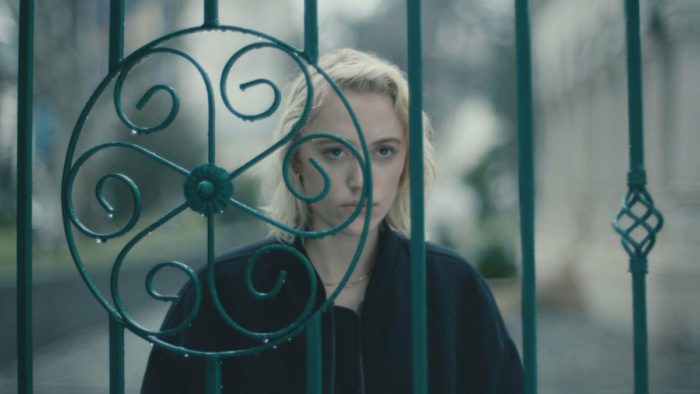After breaking through almost a decade ago in stalker horror It Follows, Maika Monroe has sadly been left without a vehicle to propel her into the mainstream (after Independence Day: Resurgence failed to do anything of the kind). It’s no surprise then that she might embrace her scream queen status and return to the kind of film for which she became known. As phenomenal as she is in this, and It Follows–it’s clear she has a knack for this kind of role–her interpretation of her character here bridles at the confines of genre film. Between them, she and debutante director Chloe Okuno reforge the generic elements in Watcher‘s script and drag them in a more melancholic, vulnerable and pained direction. How fruitful their efforts are may vary by viewer, but as a post-modern take on Giallo tropes, Watcher has aspirations more akin to Olivier Assayas’s existential masterpiece Personal Shopper than more style-oriented confections like say, Knife + Heart.
Monroe is gifted the role of Alice, an American who has just decamped to Bucharest for the sake of her husband Francis’s (Karl Glusman) high-flying career. Left to her own devices in a strange city and their goldfish bowl of an apartment, she notices a man (Burn Gorman) ominously watching her from the opposite building, and with a serial killer at large, she begins to suspect he is setting his sights on her.

You may already by catching wind of the touchstones Watcher draws from, Suspiria, Rear Window, Frenzy, there are overt allusions to The Godfather and Charade, an invocation of vampirism as well as a perfectly executed homage to Cat People. It’s pretty undeniable that Watcher wears its influences on its sleeve and risks losing itself in such a crowded marketplace. On paper, it’s an extremely predictable story, but it’s not on paper, and onscreen, Watcher conducts itself with rare form. It’s written and played with such realism and conviction–especially by Monroe who gives one of the year’s best performances in any genre, doing a superb job doing justice to her character’s fragile, complex emotional state–that it demands to be taken more seriously. It’s an intense, ruminative creation and rather than genre Giallo thrills, Watcher aims more for a slow burn, underplayed psychological chiller, in which the most tantalising possibility may actually be that it is all in our heroine’s head.
It’s exceptionally well crafted for a feature film debut, with a confident, intense style, superb handling of performance and effortless visual sensibility, the film looks gorgeous and innately unnerving from beginning to end with some phenomenal use of locations. The central theme of watching is woven not just into the story, but the dialogue and every aspect of the film’s visual language as well, with cinematographer Benjamin Kirk Nielsen’s frame capturing an articulately self-aware expression of in-universe gaze.
As with many a ‘woman in peril’ thriller, even if the husband isn’t the threat, the real horror is the fear that your significant other cannot be relied upon; that they mightn’t always put your well-being ahead of saving face or that the limits of what they will do for you aren’t as high as you’d hope. So many thrillers of this kind are rooted in mining the erroneous societal presumption that women’s perception of reality isn’t as ‘rational’ or ‘reliable’ as men’s are, one which still very much lingers today. Even if our heroine isn’t being actively gaslit by those around her, she still can’t rely on being trusted to be the best judge of her own safety.
Some of the most uncomfortable scenes in the film include not the threat of violence or the unseen gaze of another, but just the lengthy dialogue scenes in Polish between Francis and the locals to which neither we the audience, nor Alice are party. This isolating sense of exclusion is a perfect counterpoint to the mounting instability infecting every corner of Alice’s life and from which the only respite is found in her neighbour Irina (Madalina Anea), a confident loner and fellow outsider who plays a familiar role as the trusted female ally, who also provides her with one of the most blatant and literal examples of a Chekov’s Gun in recent memory.
On the subject of the film’s supporting cast, special mention should undoubtedly go to Burn Gorman as the sinister figure dogging Julia’s heels, one of those character actors who’s name you don’t know, but whose face you never forget. His angular, menacing visage is definitely going to be familiar, and it’s nice to see a film exploit it so consistently. Sound designer Frederic Dubois also makes a bid for the film’s MVP with some extremely sharp, unsettling effects work which composer Nathan Halpern is judicious enough to let breathe.
Despite its frequently uninspired story, the approach the creative heads have brought to Watcher has resulted in a tantalising film that I hope has already started to find its audience. It may hold back on the usual cycle of scare scenes, but the results are much more uncomfortable and challenging than the broad strokes would suggest. It’s an elite tier production doing everything in its power to elevate a story that could’ve been so artless and disposable. Perhaps it’s trying to be something it’s not, and some might yearn for the trashier and more fun B-movie treatment this script probably deserved. For better or worse though, everyone took the material credulously and opted for the slow-burn approach. For all its cine-literacy, Watcher never feels like hollow pastiche, and mounts a sincere and compelling study of urban isolation and marital loneliness, held together magnificently by Okuno’s finessed direction and Monroe’s committed performance, and all capped off with a satisfyingly nasty twist-of-the-knife denouement.



